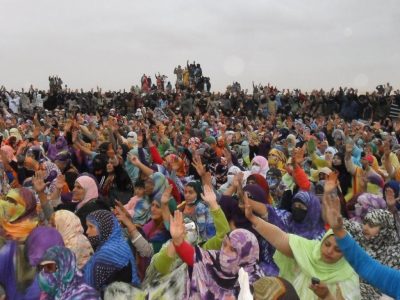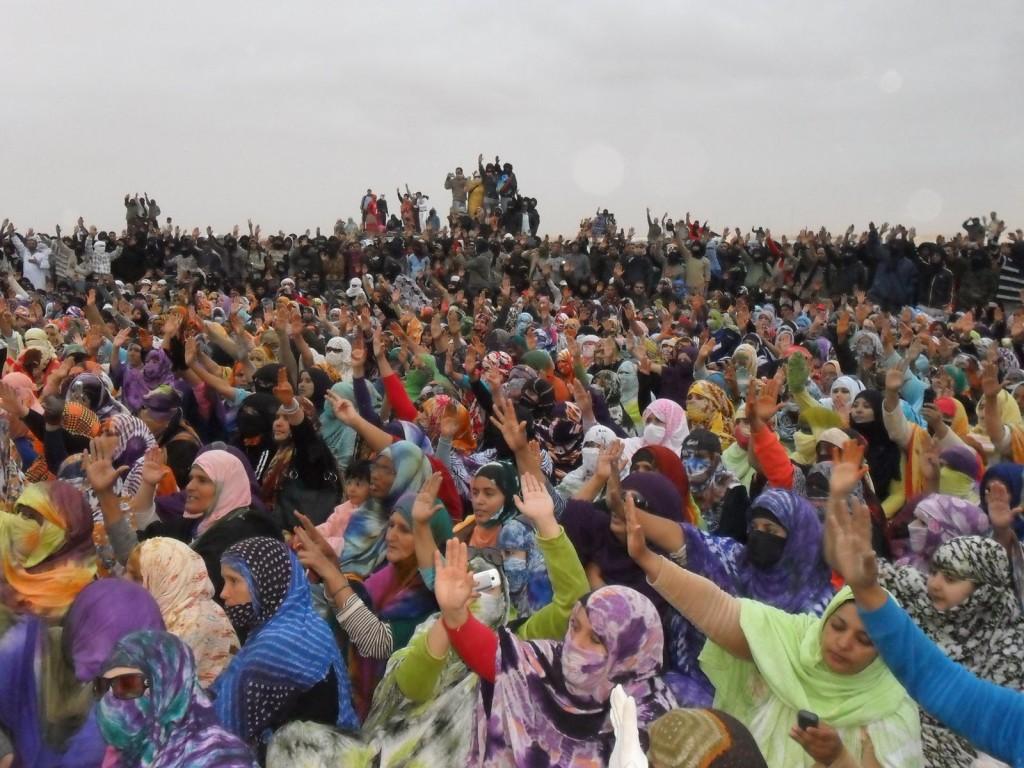 In the fall of 2010, on the outskirts of the Western Saharan capital of Laayoune, the “occupy” movement came to North Africa. For over three weeks, thousands of Sahrawis gathered at the Gdeim Izik protest camp to peacefully protest job discrimination, poor living conditions, the misallocation of Western Sahara’s rich resources, and human rights abuses.
In the fall of 2010, on the outskirts of the Western Saharan capital of Laayoune, the “occupy” movement came to North Africa. For over three weeks, thousands of Sahrawis gathered at the Gdeim Izik protest camp to peacefully protest job discrimination, poor living conditions, the misallocation of Western Sahara’s rich resources, and human rights abuses.
But this was no Zuccotti Park. What followed, according to Western Sahara expert Jacob Mundy, was “the most violent 48 hours witnessed by Western Sahara” since the UN ceasefire in 1991.
On the morning of November 8th, 2010, Moroccan authorities raided and dismantled the camp, burning its remains. Though the protest had been a peaceful up until that point, violence erupted between security forces and protesters as they were forcibly evicted. In the fracas that followed, hundreds of Sahrawis were wounded and approximately 200 were arrested. Eleven members of the Moroccan security forces were killed as the violence moved to nearby Laayoune.
Soon after, videos surfaced revealing the chaos that took place in the streets of the capital. Knife-wielding rioters attacked government buildings, set cars on fire, replaced Moroccan flags with those of the POLISARIO Front, and clashed with Moroccan security forces and loyalist citizens brandishing weapons of their own. A video quickly released by the Moroccan government included shocking footage of rioters apparently urinating on a security agent’s corpse and, at the end of the clip, beheading a Moroccan soldier.
Most of the 200 Sahrawis arrested were eventually released. But in a move condemned by the international community, Morocco denied the remaining 25 prisoners a civilian trial in favor of a martial one.
Of those that were tried in a military court, nine received life sentences, one of whom was sentenced in absentia. Fourteen others were handed down 20-30 year imprisonments, and the remaining two were released.
Although these sentences may conclude the Gdeim Izik episode—unless, by some miracle, the Moroccan government acknowledges its alleged torture of the accused and allows them a fair retrial in a civilian court—the escalating tension between Sahrawis and the Moroccan government seems to have no end in sight.
“Not one grain of sand”
The ongoing antagonism between Morocco and Western Sahara dates back to 1975, when Morocco illegally annexed the nation after colonial power Spain withdrew. Like their Palestinian counterparts, most Sahrawis desire self-determination for what has historically been their people’s territory. But Morocco considers Western Sahara to be its “Southern Provinces” and therefore under its administrative and military control.
King Mohammed VI has made it clear that independence for Western Sahara is out of the question, infamously stating, “We shall not give up one inch of our beloved Sahara. Not a grain of its sand.” Rejecting further dialogue, he has only committed to a framework that would eventually allow Western Sahara to have limited autonomy within Morocco.
A strip of territory along the border with Mauritania and Algeria—the Free Zone—is administered by the Sahrawi separatist POLISARIO Front, but that area is comprised mostly of barren desert and littered with land mines planted by Morocco’s military. The Moroccan-controlled part of the territory, which borders the Atlantic Ocean, includes the bulk of Western Sahara’s rich fishing and phosphate resources.
Morocco’s mining of these phosphates contributes tremendously to Sahrawis’ outrage. The world’s supply of phosphate, as Kristen Chick attests, “is concentrated in just a handful of countries, with more than three-fourths of that in Morocco and Western Sahara.” And the wealth that these phosphates generate is rarely distributed amongst the Sahrawi population, going instead to Moroccan settlers, foreign companies, and the king’s pocket. Indeed, according to Nicolas Pelham, phosphate revenues have allowed the king’s personal assets to balloon to over $2.5 billion—more than Queen Elizabeth II’s—despite the impoverished realm over which he presides.
While most anti-occupation activism in Western Sahara is decidedly nonviolent, Sahrawis are growing increasingly frustrated by the lack of progress with Morocco or response from the international community.
The UN has administered its Mission for the Referendum of Western Sahara, known by its French acronym MINURSO, since 1991. While the mission successfully negotiated a ceasefire that year—on the POLISARIO Front’s condition that Sahrawis would be able to vote on independence, which never occurred—there has been little substantial progress since then.
Contributing to the problem, Western nations—and particularly the United States—have been reluctant to put pressure on Morocco, a key military partner and ally in the region. Morocco, according to Ahmed Charai, has served as something of a “fire department” in the war on terror, “lending troops, spies and expertise to help snuff out anti-Israel jihadists and Al Qaeda networks.” Of late, Morocco has also offered its airspace to French troops fighting Islamists in Mali.
The fruits of “stability”
Morocco has capitalized on its heralded “stability” in the post-Arab Spring climate, reaping assistance from Washington and Riyadh alike by playing the interests of each against the other.
As democratic uprisings spread throughout the Middle East and North Africa in 2011, the Saudi-led Gulf Cooperation Council (GCC) made a rather surprising move—especially since neither country is located in the Gulf region—to invite Jordan and Morocco to join its ranks. As non-oil rich countries, Jordan and Morocco rely heavily on taxes to generate revenue and are therefore much more susceptible to domestic pressures for democratic reform. Thus a likely reason for the council’s sudden invitation, Lahcen Achy argues, was “its desire to influence the course of reforms launched within the non-oil monarchies.”
Morocco received the first portion of a $2.5-billion aid package from the GCC in February. With resource-rich Algeria funneling revenues to the POLISARIO Front, Morocco is therefore deepening its relationship with the anti-democratic GCC even as it accepts aid from Washington to implement democratic reforms in Western Sahara.
Yet even with millions of dollars of aid at its disposal, it seems unlikely that Morocco will be able to put off the issue of Western Sahara’s right to sovereignty indefinitely. The Gdeim Izik case has drawn the scrutiny and condemnation of the international press, and already the sentenced prisoners have planned a hunger strike to protest their trial and the torture many of them received while detained.
The trial has also prompted a renewed call for MINURSO, as a UN peacekeeping operation, to have its mandate extended to monitoring human rights violations in Western Sahara (a mandate shared by every other UN peacekeeping operation). After 30 years without resolution to the conflict, Sahrawis are growing increasingly restless with Morocco’s illegal occupation and the international community’s utter lack of action. Such an extension—while still a far cry from the referendum Sahrawis were promised—could at least be a step forward in providing third-party protection of Sahrawi human rights.
